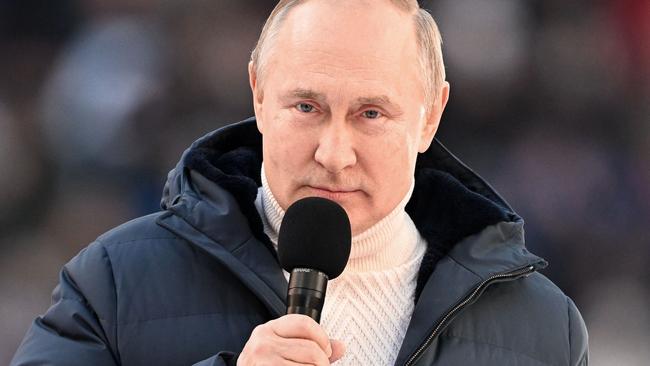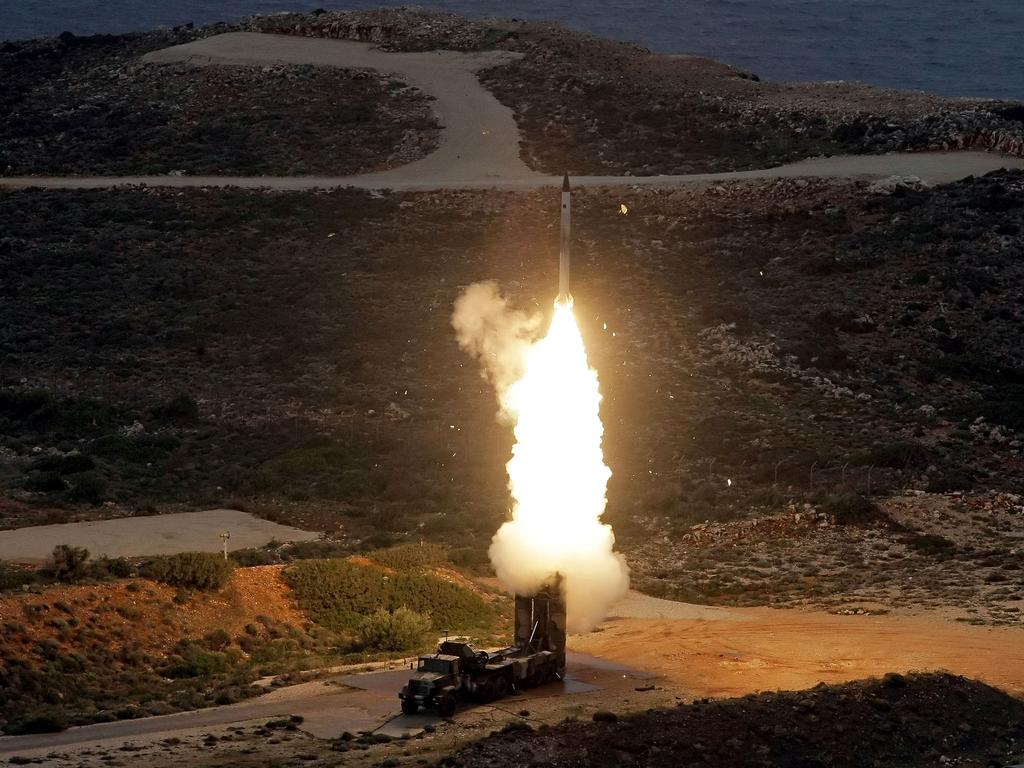The war raging in Putin’s paranoid mind sparked by KGB defection 37 years ago
An obsessive hunt for traitors and spies in the Russian system has its roots in President Vladimir Putin’s traumatic time as a young KGB officer.
In the summer of 1985, a young KGB officer in Leningrad received some shocking news that would shape him for life.
A more senior officer, Oleg Gordievsky, had vanished to the West after a decade working as a spy for MI6. To make matters worse, he had escaped via Leningrad, which made the Leningrad KGB responsible in the eyes of Moscow Centre, the Soviet intelligence headquarters.
Heads immediately began to roll. The young officer’s bosses and patrons within the KGB were blamed for the security failure, humiliated and fired. For a time, his own intelligence career stalled.
The incident left him with two lifelong convictions: there is always someone to blame when the system fails, and there are spies and traitors everywhere, notably within your own ranks.
The young spy’s name was Vladimir Putin.
Nearly 40 years later, the effects of that ingrained paranoia are playing out in Moscow as Russia’s President turns on his own spies and security chiefs in a faltering war.
On Thursday, the FSB, the federal security service and successor to the KGB, arrested General Roman Gavrilov, deputy head of the national guard and one of Putin’s most senior security chiefs. Gavrilov is suspected of leaking intelligence related to the war in Ukraine.
His detention is part of an internal hunt for scapegoats and a radical shake-up of state security.
Gavrilov is said to have disclosed “military information that led to loss of life”.
With Russia’s invading army grinding to a halt for lack of petrol, he is also accused of a “wasteful squandering of fuel”.
But the FSB, the ruthless internal enforcement agency of Putin’s rule, is also purging itself.
Last weekend, Colonel General Sergey Beseda, head of the FSB’s Fifth Service, and his deputy, Anatoly Bolyukh, were arrested for corruption and intelligence failings.
The Fifth Service carries out foreign operations, building up networks of pro-Russian politicians and fifth columnists in neighbouring countries.
Beseda was once a trusted man, regarded as the FSB’s eyes and ears in Ukraine. He is believed to have been involved in the violent efforts to suppress popular protests during the anti-Russian Maidan revolution in February 2014.
Beseda wrongly predicted that the pro-Russian president, Viktor Yanukovych, would hang on to power, but he survived by blaming the SVR, Russia’s foreign intelligence service. He is now accused of embezzling funds intended to build up pro-Russian sentiment in Ukraine; more likely, he reassured Putin the invasion would be a walkover.
This is the conundrum of Russia’s intelligence system, ruled by one man: if you tell the boss what he doesn’t want to hear, you are fired; if you tell him what he wants to hear and that turns out to be wrong, you are also fired.
So the best way to survive is to tell him what he wants to hear and hope it turns out to be correct. No intelligence service can work this way.
Letters purporting to be written by an FSB whistleblower, “Wind of Change”, suggest a climate of fear within the security service, but the SVR may also be in the frame.
On the eve of the invasion its chief, Sergey Naryshkin, was humiliated by Putin on state television.

In his latest televised rant, Putin promised to “purify” Russia of turncoats.
“Russian people are able to distinguish between true patriots and scum and traitors, and simply spit them out like a fly that flew into their mouths … a natural and necessary self-purification of society will strengthen our country.”
He also lashed out at “those who have a villa in Miami or on the French Riviera, who can’t do without foie gras, oysters or gender freedoms”.
All of this is straight out of the Stalinist playbook: spy agencies attacking one another and searching for internal betrayal, brutal purges and swelling rhetoric against perceived enemies of the people corrupted by Western luxuries and moral decadence.
Stalin’s great purge between 1936 and 1938 was carried out by the NKVD, predecessor to the KGB, using torture to extract false confessions of espionage and treachery. Some 681,000 people were murdered, most of them innocent. Survival often depended on betraying others. Because the NKVD was composed of spies it, too, became suspect, accusing, framing and then systematically killing its own people. Stalin’s spy agency consumed itself, just as the FSB is turning inward today.
As well as being bogged down in Ukraine, Putin is losing the espionage war. In the run-up to invasion, the US released copious intelligence correctly predicting what subsequently happened.
This could only have come from within Putin’s inner circle, probably from a human intelligence source since the Russian President is highly distrustful of digital communication: that suspicion will have further stoked his raging obsession with internal betrayal.
The West is also providing Ukraine with intensive and effective cyber support. The five Russian generals killed to date have died not just because they were leading from the front but because the Ukrainians, with help from the West, had the technical capability to know exactly where they were.
There is one more highly effective espionage weapon in the Western arsenal, pioneered in Britain. In September 1971, four years before Putin joined the KGB, the UK launched Operation Foot and kicked out 105 Soviet intelligence officers working in Britain under diplomatic cover, the largest spy expulsion in history. The move marked a turning point in Cold War counterespionage from which the KGB never fully recovered.
Ukraine’s allies should repeat the operation and expel every suspected Russian spy, depriving Putin of the espionage network on which his power and reputation are largely based. Spy sanctions would hit him where it hurts most.
The fate of Ukraine will be settled on the battlefield but it is also being fought out in Putin’s mind, an organ shaped by the KGB and its history of internal treachery, paranoia and self-destruction.
THE TIMES




To join the conversation, please log in. Don't have an account? Register
Join the conversation, you are commenting as Logout